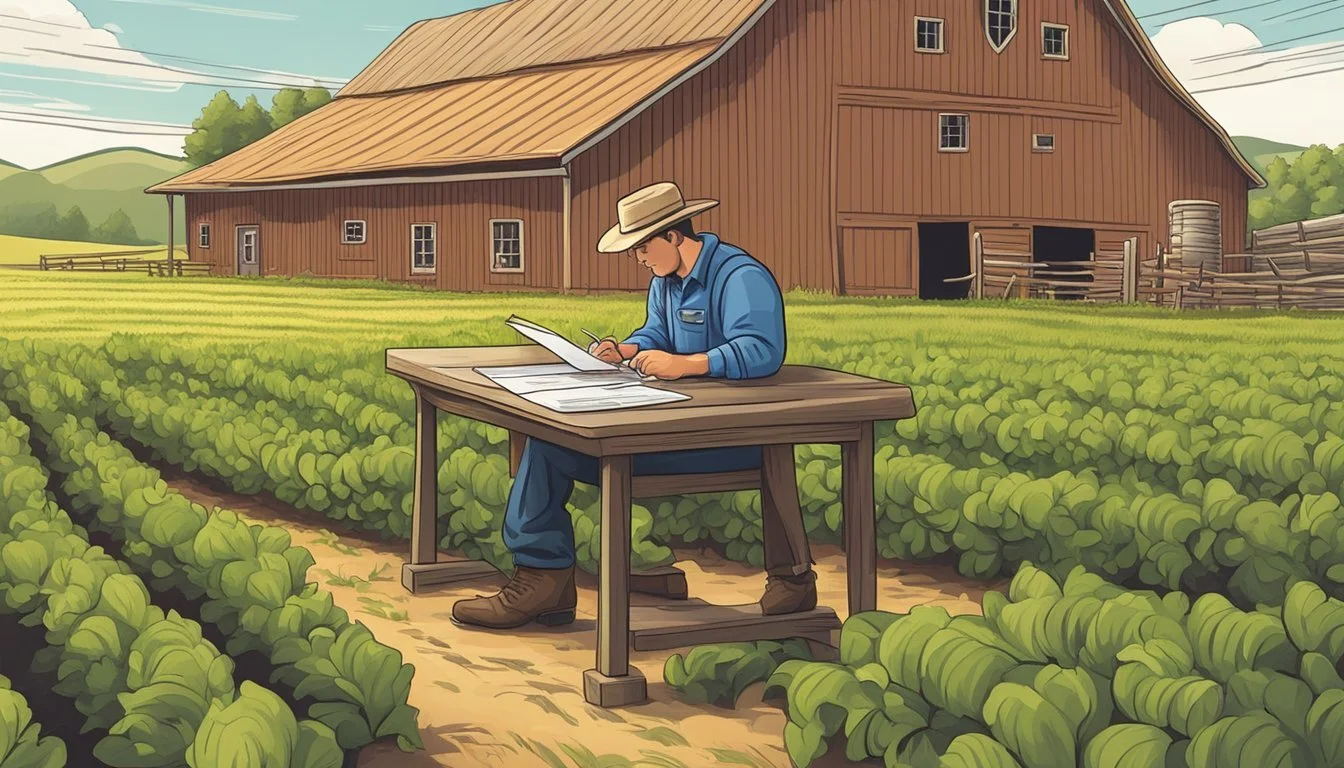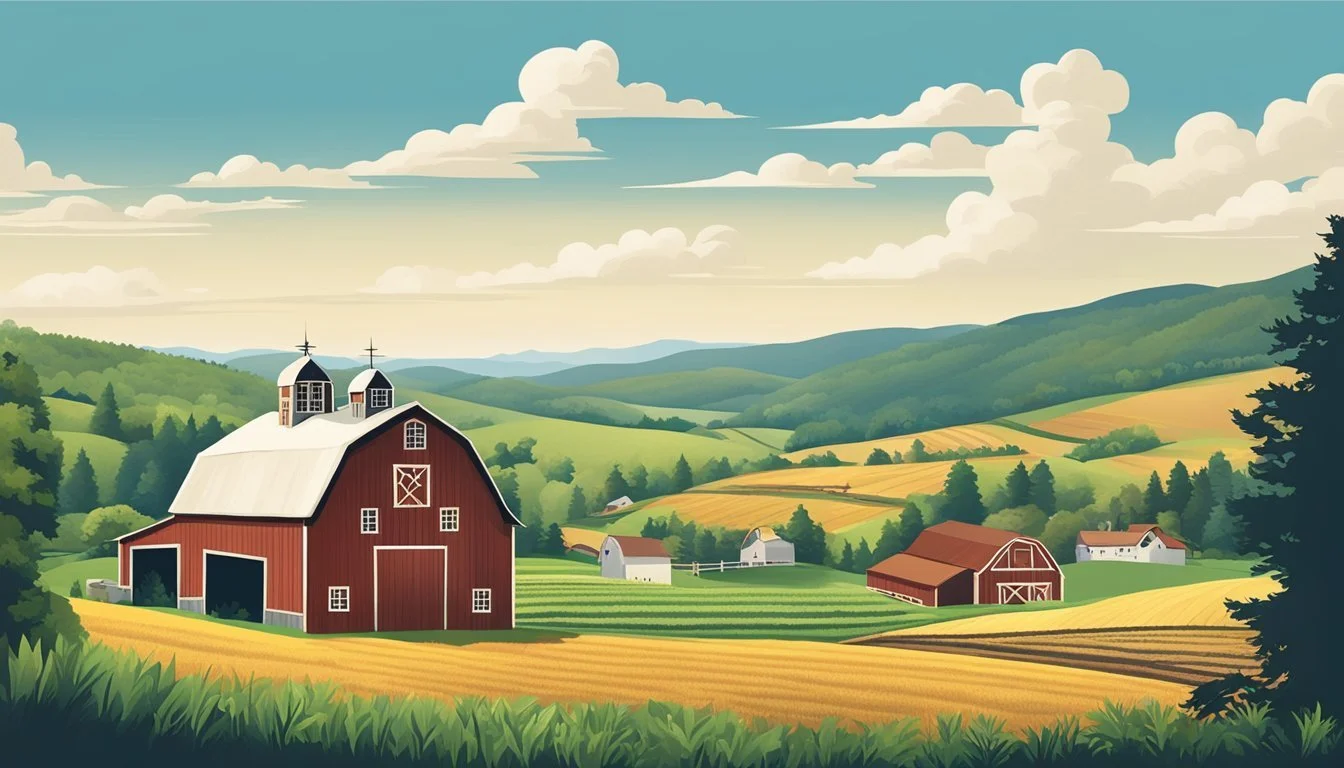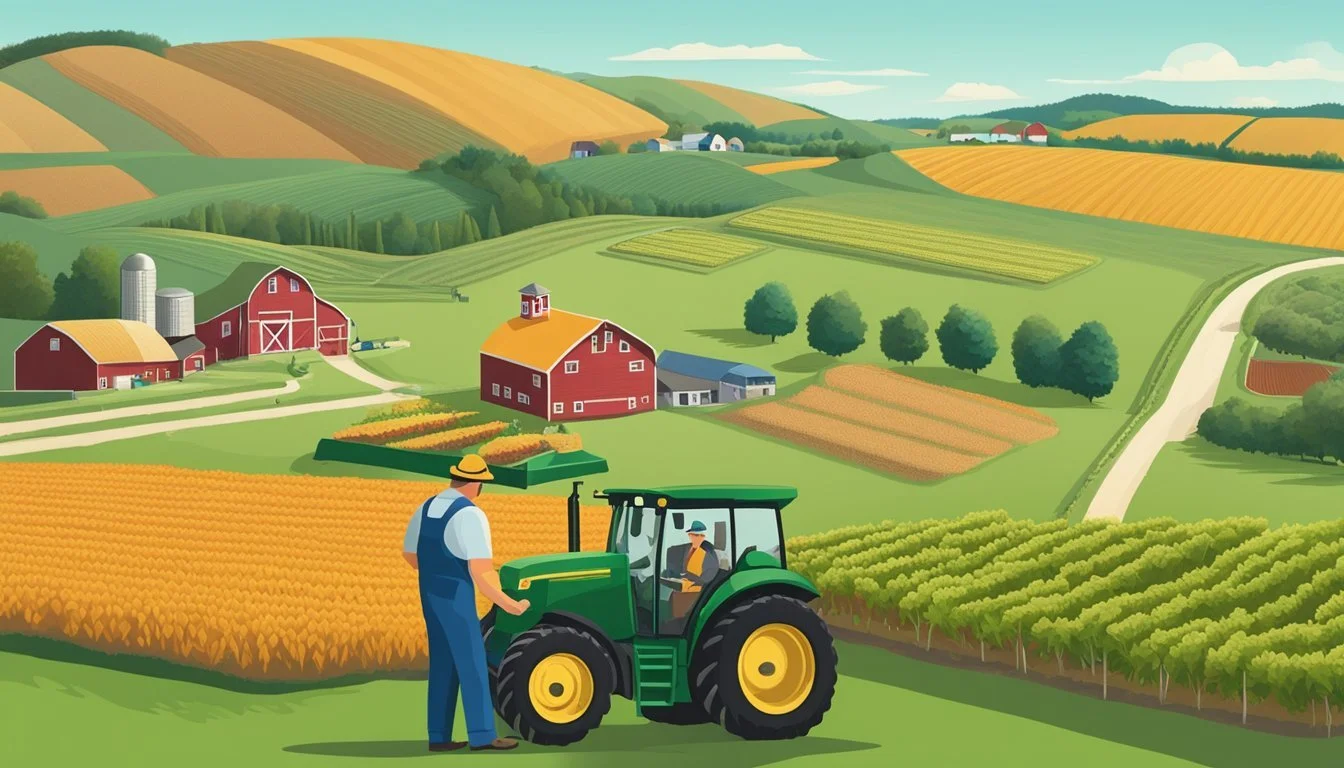Farm Loans in Vermont
Navigating Options and Opportunities
This Article is Part of Our Guide on Farm Loans for All 50 U.S. States
In Vermont's vibrant agricultural landscape, farm loans play a crucial role in sustaining and developing the diverse agricultural operations that characterize the state. These loans provide essential capital that enables Vermont farmers to invest in equipment, seed, livestock, and other necessary inputs to maintain and grow their farming businesses. Given the state's commitment to supporting its agricultural sector, various farm loan programs have been established to meet the unique needs of Vermont farmers, from those running small family businesses to larger-scale producers.
Financial institutions and specialized agencies offer different types of farm loans in Vermont. These range from operating loans for day-to-day expenses to financing aimed at encouraging growth and diversification. Vermont farm loans are typically designed to be accessible, offering flexible terms that accommodate the seasonal nature of farming. Additionally, state-supported initiatives like the Vermont Agricultural Credit Corporation (VACC) provide targeted financial support to strengthen farm operations within the state framework.
Specialized funds and programs, such as the Vermont Farm Fund, also exist to provide friendly-term loans to Vermont's agriculture-related businesses. This support extends to times of crisis, as some funds are equipped to offer emergency loans in the wake of events like flooding, which can significantly impact farm productivity and livelihoods. These resources underscore the collaborative approach between public entities and private stakeholders in nurturing an environment where agriculture can flourish in Vermont.
Understanding Farm Loans in Vermont
In Vermont, farm loans serve as essential financial tools for farmers aiming to invest in land, equipment, and operations. These loans enable both existing farm operations to grow and new farmers to enter the industry.
Historical Perspective
The landscape of farm loans in Vermont has developed over the years to support various farm-related activities. Since 2020 and beyond, a stronger emphasis has been put on assisting Vermont farmers through diverse lending programs that accommodate a range of agricultural needs. This includes purchasing land, acquiring livestock, and building necessary infrastructures such as barns and greenhouses.
Types of Farm Loans
Vermont offers a variety of loan types to cater to the distinct needs of its agricultural community:
Farm Ownership Loans: Aimed at helping farmers purchase land and construct buildings.
Operating Loans: These are used to cover the daily operational costs, including seeds, fertilizer, and equipment maintenance.
Equipment and Livestock Loans: Specific loans intended for purchasing machinery and livestock.
Each loan type is designed to strengthen the agricultural economy by providing the necessary capital for farmers to maintain and expand their operations.
Key Entities Providing Loans
Several entities are dedicated to providing farm loans in Vermont:
Vermont Agricultural Credit Corporation (VACC): A nonprofit corporation offering credit to Vermont's agricultural facilities and forest-based businesses.
USDA Farm Service Agency: Offers microloans and guaranteed loans to small, niche, and beginning farmers.
Vermont Farm Fund (VFF): A revolving loan program designed to extend no-hassle, friendly-term loans to Vermont farmers and food producers, in partnership with organizations like Pete's Greens.
These entities work hand in hand to ensure that Vermont's agricultural sector has access to necessary financial resources.
Eligibility and Application Process
The application process for farm loans in Vermont involves determining eligibility, compiling the necessary documentation, and submitting a completed application.
Determining Eligibility
Farmers and agricultural business operators in Vermont looking to apply for a loan must first establish their eligibility. Eligibility criteria typically include the nature of the operation, such as whether it is a beginning farm or an existing farm operation, and financial requirements, which can include minimum gross annual sales. Beginning farmers and smaller operations may have different eligibility standards compared to established farms.
Owner/Operators: Must be operating within Vermont.
Beginning Farmers: Special considerations often apply.
Financial Health: Applicants must generally demonstrate sound financial status.
Operation Type: Agricultural and forest-based products businesses are often eligible.
Preparing Your Application
Compiling the necessary application information is a crucial step in the loan process. Applicants typically need to provide detailed documentation about their operation, financial records, and a business plan outlining the use of funds.
Documentation to Prepare:
Business Plan
Financial Statements (past and projected)
Legal Descriptions of Property
Detailed Plan for Loan Usage
Submitting the Application
Once the required information is gathered, farmers in Vermont can proceed to the application process. Handling this process online via farmers.gov or in person through a local Farm Service Agency can both be viable options, offering different levels of support and assistance during the process.
Farm Service Agency: Support is available via local offices.
Online Submission: Applications can be submitted through farmers.gov.
Assistance: One-on-one help is often available for applicants, especially for beginning farmers.
Applicants are encouraged to reach out to state program coordinators or farm loan officers for additional guidance. The ultimate goal is to provide a seamless pathway for borrowers to secure funding necessary for the growth or sustenance of their farm operations in VT.
Financial Products and Terms
Vermont offers a diverse range of financial products tailored to support the agricultural sector. These products come with specified terms designed to address the various needs of farm operations, from emergency funds to long-term investments.
Agricultural Credit
Agricultural credit in Vermont is provided by institutions such as the Vermont Agricultural Credit Corporation (VACC) and includes credit solutions for farmers, agricultural facilities, and forest-based businesses. Agricultural credit is essential for supporting Vermont's farm operations due to the varying nature of the agricultural business cycle and investment requirements.
Loan Products
A variety of loan products are available to Vermont farmers and food producers, featuring:
Emergency Loans: For immediate needs due to unforeseen circumstances such as natural disasters.
Business Builder Loans: Aimed at supporting growth and expansion of farm-related businesses.
Operating Lines of Credit: To cover day-to-day operating expenses.
Real Estate Loans: For the purchase of land or property instrumental to the farm operation.
Loan amounts and terms are adjusted to meet the unique needs of each borrower, ensuring the financial stability of their business.
Interest Rates and Repayment
Loan interest rates are variable or fixed, and they're typically based on the lender's cost of funding. These rates strike a balance between affordability for borrowers and financial viability for lenders:
Type of Loan Interest Rate Nature Typical Terms Short-term Variable or Fixed up to 7 years Long-term Fixed 10 to 30 years
Repayment schedules are structured to align with the farm's cash flow, often accommodating seasonal fluctuations in income. This ensures that farmers can sustain their operations while managing their debt obligations effectively.
Specialized Loan Programs
Vermont offers a variety of specialized loan programs aimed at supporting the unique needs of its agricultural sector, from emergency scenarios to sustainability projects and business expansion.
Emergency and Disaster Loans
Vermont's agriculture sector can access emergency and disaster loans to aid recovery from unforeseen events. The Vermont Farm Fund (VFF) provides Emergency Loans with friendly terms. In times of crises such as flooding, these loans are available with 0% interest, aiming to assist farmers with immediate relief and to ensure quick resumption of operations.
Loan Amounts: VFF offers emergency loans typically between $5,000 to $10,000.
Repayment: Flexible payment schedule over 2 years.
These loans often help with repairing infrastructures like greenhouses and investing in soil and water conservation to mitigate future risks.
Green Loans for Sustainability
Vermont encourages agricultural sustainability through green loans that support environmentally friendly practices. Farmers can utilize these loans to invest in sustainable technologies, like energy-efficient greenhouses and renewable energy sources. Not only do these loans contribute to a greener ecosystem, but they also serve as long-term investments that can improve a farm's overall efficiency and profitability.
Purpose: Enhance sustainability through investments in green tech.
Long-term Benefits: Improved operational efficiency and reduced environmental impact.
Diversification and Expansion
Expansion and diversification are vital for the growth and resilience of Vermont's farming businesses. Loans targeting these areas encourage farms to diversify their produce, invest in livestock, or broaden their processing capabilities. This strategic move enables farmers to tap into new markets, spread business risks, and enhance their overall financial stability.
Goals: Encourage marketing, expand product lines, and invest in livestock.
Impact: Greater market reach and risk management through diversification.
By utilizing these specialized loan programs, Vermont farmers are better equipped to handle emergencies, implement sustainable practices, and pursue growth opportunities through diversification and expansion.
Aiding Business and Marketing
Vermont farm loans play a critical role in boosting the business and marketing efforts of the state's agricultural and forestry sectors. These financial instruments are tailored to enhance sales and expand the market reach of Vermont agricultural products and forest crops.
Marketing Assistance
Farm loans in Vermont are designed to facilitate marketing and sales initiatives for producers of specialty crops, such as orchard products, maple syrup, and other forest crops. Financial support, such as Trade Show Assistance Grants, enables these businesses to exhibit at out-of-state and international trade shows, increasing visibility and demand for Vermont's agricultural commodities.
Agricultural Facilities and Forestry
Loan programs support the development and enhancement of agricultural facilities necessary for operations and processing. The aim is to strengthen the infrastructure that benefits the agriculture and forestry community, allowing for more efficient production and marketing of goods. This includes funding facilities for nurseries, floriculture, and forest product-based businesses, underpinning a robust rural economy.
Supporting Rural Development
By providing capital for rural development, Vermont farm loans contribute to the community by assisting beginning and existing farmers to diversify and pursue new market opportunities. The focus on direct marketing and processing of Vermont products by agricultural and forestry enterprises underlines the commitment to sustainable rural economic growth.
Practical Insights for Vermont Farmers
Vermont farmers looking for financial support have various loan options to consider, each designed to strengthen existing farm operations, enhance food production, and support the vibrant agricultural community.
Managing Loan Repayments
Farmers must approach repayment strategically, as terms can vary widely. Borrowers should prioritize loans with the highest interest rates for early repayment and maintain accurate financial records to ensure timely payments. They also need to ensure that their farm's production is efficient enough to generate the necessary income for loan repayment. Establishing a strong relationship with lenders can provide more flexible repayment options, especially during challenging seasons.
Rising to Challenges
Farmers in Vermont are known for their resilience, often raising equines, livestock, and crops like maple under variable weather conditions. Financial challenges—whether due to market fluctuations or natural events—can be mitigated through emergency loans offered by organizations like the Vermont Farm Fund, which provides zero-interest loans to those affected by unexpected disasters. By leveraging such support, Vermont farms can bounce back and continue their crucial role in food production.
Success Stories and Case Studies
Several Vermont farms have benefited from loans to diversify or expand their operations. For instance, a farm expanding into maple syrup production found that borrowing allowed them to invest in necessary equipment to tap into this lucrative market. Food producers have used loans for raising livestock or cultivating specialty crops, turning modest operations into thriving businesses. Case studies often highlight the prudent use of loans as a catalyst for growth in Vermont's agricultural sector.
Additional Resources and Support
Farmers in Vermont have access to a robust network of resources designed to support their agricultural endeavors. These range from government-backed initiatives to community-driven support systems aimed at offering education, financial planning, and strategic advice for the long-term sustainability and success of farms.
Government and Community Support
The USDA Farm Service Agency (FSA) provides a variety of programs for farmers and ranchers, including direct and guaranteed loan programs. For instance, the Inflation Reduction Act has offered financial support to distressed borrowers since October 2022. The USDA's Natural Resources Conservation Service is another resource, facilitating programs such as the Conservation Reserve Enhancement Program which helps improve water quality.
Local initiatives like the Vermont Farm Fund, in collaboration with organizations like The Center for an Agricultural Economy and Pete's Greens, offer friendly-term loans to support Vermont farmers and food producers.
Education and Training
Vermont's agricultural community can benefit from training and educational programs aimed at enhancing farming practices and business acumen. Information on such programs can be found through online platforms such as farmers.gov, which consolidates outreach and educational opportunities for rural development in the state.
Support services like Vermont Agency of Agriculture's Farm First provide resources and a hotline for farmers seeking assistance, underscoring the importance of readily available help and advisory services.
Financial Planning and Advice
Expert financial advice is critical to the sustainable management of a farm. Vermont's farmers can engage with technical assistance programs specialized for dairy farming cohorts or seek individualized advice on financial matters by connecting with resource coordinators through platforms like farmfirst.org.
USDA assistance and federal relief payments are also on offer for challenges posed by events such as the coronavirus outbreak, providing a financial safety net for the state's agricultural workers.
Structured support, informed by a deep understanding of the needs of Vermont's farming industry, equips producers with the tools for resilience and growth.







